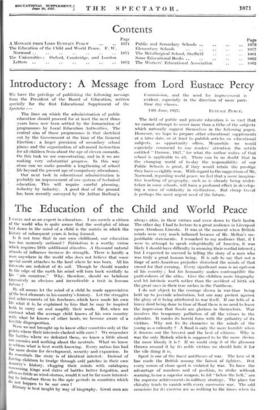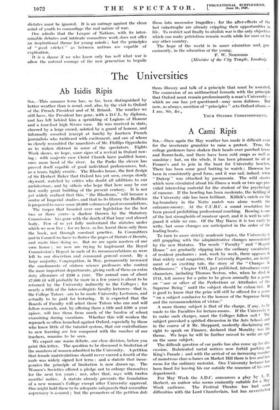The Education of the Child and World Peace I WRITE
not as an expert in education. I am merely a citizen of the world who is quite aware that the seed-plot of ideas laid down in the mind of a child is the matrix in which the history of subsequent years is being formed.
Is it not true that in our own childhood, our education was too narrowly national ? Patriotism is a worthy virtue Which requires little additional stimulus. A thousand natural strands of influence increase its strength. There is hardly a man anywhere in the world who does not believe that some special merit attaches to the land where he was born. All his interests are redolent of its soil. Though he should wander to the edge of the earth his mind will turn back wistfully to us " aim countree." Why, therefore, should we belabour eiRessively so obvious and ineradicable a trait in human nature ?
Ry all means let the mind of a child be made appreciative 9f the best elements in his country's history. Let the struggles and achievements of his forebears, which have made his own life what it is, be explained to him that Ile may be inspired both to carry on and amplify their work. But, when we contrast what the average child knows of his own country with what he knows of other lands, we become aware of a terrible disproportion. Were we not brought up to know other countries only at the points where their interests clashed with ours ? We remember `he battles -where we defeated them, we know a little about our enemies and nothing about the neutrals. What we know ?s seldom what is best worth knowing. Every nation has had the same desire for development, security and,expansion. In its essentials the story is of identical interest. Instead of forcing children to trudge through arid patches in their own pountrf s history, clogging their minds with catalogues concerning kings and dates of battles better forgotten, and ?ften as futile as wind-storms, would it not be-far more interest- to introduce them to the epic periods in countries which 4° 11.ot happen to be our own ?
Illstory is best taught by way of biography. Great men are always akin, in their virtues and even down to their faults!. The other day I had to lecture to a great audience in Liverpool upon Abraham Lincoln. It was at the moment when British minds were very much inflamed because of Mr. Mellon's un- justifiable statements. I remarked to my audience that, if I were to attempt to speak eulogistically of America, it was likely I should have difficulty in arousing their cordial interest ; but I expected to succeed in telling the story of a man who was truly a great human being. It is safe to say that not a tinge of anti-American prejudice disturbed the minds of that crowd for that evening. Every significant man is an epitome of his country ; but his humanity makes contemptible the parti-colours of the atlas. Give the children more biography and let intrinsic worth rather than the accident of birth set the great ones in their true niches in the Pantheon.
I do not object to the courage shown in war-time being held up to juvenile admiration, but one may protest against the glory of it being attributed to war itself. if one tells of a brave deed being done in time of flood there is no need to leave the impression that floods are glorious in themselves. War involves the temporary palliation of all the crimes in the calendar. It masks its horrid form with the gallantry of its victims. Why not fix its character in the minds of the young as a calamity ? A flood is only the more horrible when it drowns out the bravest and the best of citizens. Why is war the only Moloch which is supposed to be the more divine the more bloody it is ? If we could strip it of the glamour thrown around it by its noble victims we should hate it for the vile thing it is.
Sport is one of the finest antitheses of war. The love of it has made the British among the fairest of fighters. But every canon of clean sport is violated by war. To have the advantage of numbers and of position, to strike without warning, to use a superior weapon, to hit "below the belt," are the supreme achievements in military strategy. The place for. chivalry tends to vanish with every successive war. The odd occasions for its exercise are as nothing to the times when its dictates must be ignored. It is an outrage against the clean mind of youth to camouflage the real nature of war.
One admits that the League of Nations, with its inter- minable debates and intricate committee work, does not offer an inspirational theme for young minds .; but the principles of " good cricket " as between nations are capable of explication.
It- is a shame if we who know only too well what war is allow the natural courage of the new generation to beguile them into successive tragedies ; for the after-effects of the last catastrophe are already crippling their opportunities in life. To restrict and finally to abolish war is the only objective which can make patriotism remain worth while for ours or for any other country.
The hope of the world is in saner education and, pre- eminently, in the education of the young.
F. W. NORWOOD • (Minister of the City Temple, London).



























































 Previous page
Previous page